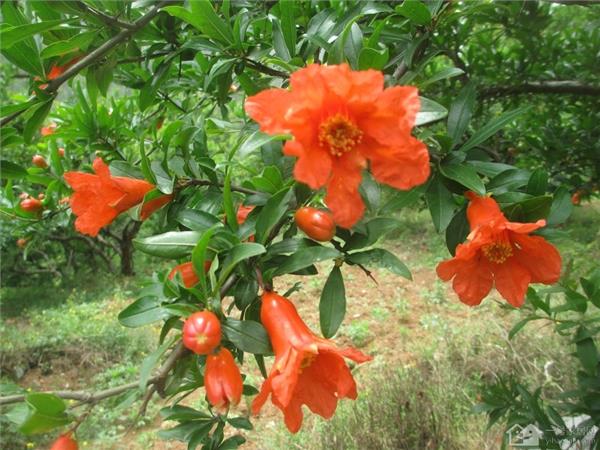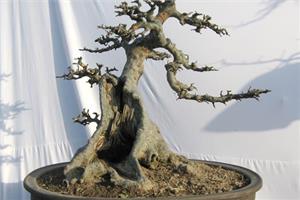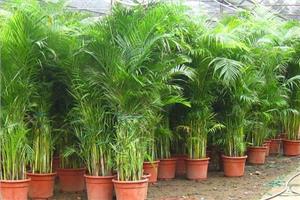Tips on how to cultivate pomegranate flowers
Pomegranate is a deciduous tree with small, orange-red flowers at the top of branches. Pomegranate flowers are not only beautiful, but also can be used as medicine. Nowadays, many people like to breed it at home for viewing. Is also a very characteristic flower, beautiful and generous to enjoy at home is also good. Now let's talk about how to grow pomegranate flowers. What are the skills of its breeding?

How to grow pomegranate flowers
1. Illumination: pomegranate flowers are sunny plants, the best sunshine time is 12 hours a day, because pomegranate trees need sufficient light if they want to grow up. Generally, the exuberant sunshine in summer is the best storage period for autumn fruit. The better the sunshine is, the bigger the flower is, the better the fruit is.
3. Soil: pomegranate trees have the lowest requirements for soil, and generally natural soil can be planted, but potted pomegranates suggest that the soil still needs to be a little more fertile.
4. Temperature: pomegranate flowers like to be warm, so they grow fastest in late spring and summer, but the general temperature should not be less than 10 degrees Celsius during the winter, otherwise the pomegranate trees will suffer frostbite and stop growing and go into dormancy.
Tips for feeding pomegranate flowers
1. Selecting varieties with beautiful flowers and fruits has more ornamental value, such as pink sweet pomegranate, agate pomegranate, white flower pomegranate, red shell pomegranate, four seasons pomegranate and soft seed pomegranate.
2. Selection of pots and earthen flowerpots: tile pots, wooden buckets and wooden cases. The mouth of the pot is 30 mi 40 m in diameter and 30 mi 35 m deep. Nutrient soil preparation: 7 parts of humus or humus soil, 2 parts of turf soil, 1 part of sand soil. All kinds of soil will be broken and sifted, mixed evenly, piled up, covered with branches or other combustibles, ignited, not only increase plant ash, but also play a role in high-temperature treatment of the soil.
3. Seedling cultivation pomegranate seedlings can be propagated by cutting and striping. It is required to cut the robust 1-year-old branches from the mother tree, the branches are full and robust, the bud eyes are full, and the diameter is 0. 5 cm, cut and grow about 20 cm, insert it in sand or other loose matrix and keep it moist. Under the condition of 20 ℃, it can take root and sprout in about 20 days.
4. Transplant the seedlings into the basin in the middle and last ten days of March. Before planting, the drainage hole of the basin bottom is covered with tiles, and the bottom of the basin is filled with some nutritious soil. The seedlings are put into the basin, covered with soil, lifted up a few times by hand, watered, and then covered with soil. The filling in the basin should be 5 meters lower than the edge of the basin. Then place the pot in a sunny place to increase humidity and promote root growth.
5. Manage pomegranate like fertilizer after planting, apply more base fertilizer when planting, apply some organic fertilizer after defoliation in autumn and winter, and apply quick-acting fertilizer before leaf, before and after falling flower respectively. Potted pomegranate, because the potted soil is limited, the amount of fertilizer should not be too much each time, we should "eat less and eat more". The commonly used fertilizer is mainly organic fertilizer such as cake fertilizer, which is fermented and applied with liquid fertilizer.
6. Shaping and pruning potted pomegranate has the characteristics of tight branches and dense leaves. During dormancy, a thinning pruning can be carried out, which can be formed into a single dry round head type, or into a multi-stem cluster or flat top type.
7. Keep the potted pomegranate in a sunny greenhouse in winter, and the room temperature should not exceed 5 ℃ to maintain normal dormancy.
Finally, I would like to say that pomegranate flowers can adapt to many of their growing environment, and seem mediocre, but can produce beautiful and colorful flowers.
The above is the relevant introduction of this article, I believe you have a simple understanding of this after reading it, if necessary, you can continue to pay attention to the No. 1 home network for more information.
Related
- Wuhan Hospital Iron Tree Blooming Result Was Instantly Frightened by the Gardener Master
- Which variety of camellia is the most fragrant and best? Which one do you like best?
- What is the small blue coat, the breeding methods and matters needing attention of the succulent plant
- Dormancy time and maintenance management of succulent plants during dormancy
- Minas succulent how to raise, Minas succulent plant pictures
- What are the varieties of winter succulent plants
- How to raise succulent plants in twelve rolls? let's take a look at some experience of breeding twelve rolls.
- Attention should be paid to water control for succulent plants during dormant period (winter and summer)
- Watering experience of twelve rolls of succulent plants
- Techniques for fertilizing succulent plants. An article will let you know how to fertilize succulent plants.



